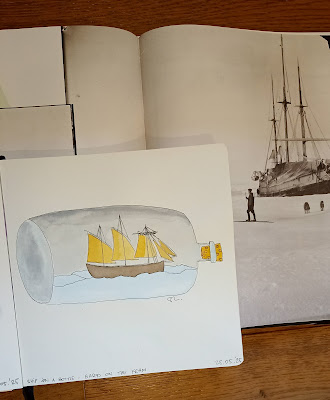Changing the world one book at a time. 'The Nature of Nature' by Enric Sala.
Since finding out more about marine ecology, I've been a huge ocean fan. It can't be stressed enough how important the oceans are to our modern society. They deliver oxygen, store carbon, offer the most important form of protein for millions of people, allow tourism and recreation. And of course: there is the wonder of it all. Mesmerising kelp forests with 30-metre-high underwater canopies, vibrant coral reefs full of sharks and colours, enchanting mangrove forests, stretching their roots deep in salty waters creating a nursery for the smallest of fish.
Yet, instead of giving these ecosystems the respect they deserve, our human impact has led to overfishing, water pollution, global heating and ocean acidification. Protecting these ecosystems and fighting their destruction has been the primary goal of National Geographic Society's Pristine Seas project. It's worth visiting their website: let yourself be inspired with what our oceans could look like if only we took better care of them.
When I noticed Enric Sala, the director of this project, wrote a book 'The Nature of Nature', I had to read it. This book is about more than just oceans, though. It's a stepping stone for all who want to learn more about how ecosystems function, why they are important and how we can protect them. He explains all about succession, energy flow, keystone and foundation species, landscapes of fear, shifting baseline syndrome and biophilia. He shows how all life is interconnected and interdependent. He tells about habitat destruction and the impact of industrial fishing. He explains why humans, as a species, are so different from other species, and yet not so different at all. And above all: he shows how it can be done differently. How we can create both a healthy environment and a place to live in, to feed us. Sala sees solutions in a more efficient food system, flexitarian diets, avoiding food wastes, tackling overfishing and better aquaculture. This can all be done with respect for local communities and without threatening food provisioning. On the contrary, Sala shows how regenerative agriculture leads to a healthier soil and how strictly protected marine reserves actually lead to bigger catches and healthier fish stocks.
Whoever fears statistics and hard to digest data: rest assure, this book is everything but. Sala's focus is on storytelling. He not only takes you to the waters around the Medes Islands or Cabo Pulmo, he also gives you a tour at Knepp Estate, Yellowstone and the Corsican forests. Enric Sala beautifully describes ecosystems I dream of once visiting to make people conscious of the beauty of our natural world. Because that is how we'll reach politicians and broad publics: by the magic of it all. If we want policy to change, we need to capture the attention of those in power. We need to bring them magic, stories and wonders.
That is exactly what Enric Sala does in this book and with Pristine Seas. Sala reminded me it is not numbers and scientific papers that are going to change the world. It is love. Love for nature through art, stories, pictures and movies. It is why I am such a fan of the photographs and elaborate stories in National Geographic. Why David Attenborough earlier this year still presented the documentary Wild Isles at age 97. Why organisations like SeaLegacy share spectacular images on their Instagram account and why Rewilding Europe is now also offering trips. It's really all about the magic.
People called me mad when I started studying Environmental Science halfway my 30s, but this is why. I hope to one day inspire people to take better care of their environment. I hope to bring them back in nature and bring nature back to them, through showing them what it is like to live in green cities instead of concrete deserts, to feel connected to our natural environment instead of seperated from it, to feel the same pride the Pristine Seas communities feel, knowing they leave behind a better place for their children, instead of the shame, knowing they were part of the destruction.
I'll get my degree at age 40, the same age Sala was when he founded Pristine Seas. So: yes, I have a big task ahead of me. But hey, life only begins at 40, right?





Reacties
Een reactie posten